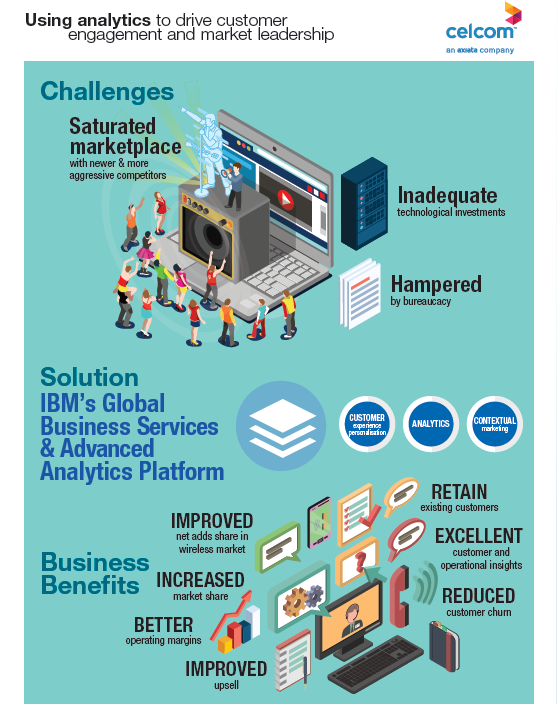
Using analytics to drive customer engagement, market leadership
By Digital News Asia October 4, 2016
- Placed customer experience centre-stage, personalised customer experience
- Among benefits for Celcom Axiata was a 90% reduction in time spent on analytics

[Beginning October, in a commercial arrangement, DNA will feature every article in a special 2015 pdf book, the Malaysian Digital Economy Corporation (MDEC) produced called, Exposing the Promise of Big Data Analytics: Case Studies in Malaysia. A link is provided at the end of each case study to download the full version.]
You won't find many organizations with more data than a mobile telco. Imagine if you had 13 million customers as Celcom Axiata did in 2015. How do you convert that untapped mass of data you collect every day into actionable insights?
For Celcom, it was all about finding the right partner and creating momentum for change led from the top. And so it was that Celcom partnered with IBM Global Business Services to leveraga on its technology to power Celcom's data ambitions. The results could not have been more spectacular.
A 90% reduction in the time spent on analytics, a 98% engagement rating amongst the front-liners or customer facing employees, 70% increase in campaign performance which drove up its return on investment, and 80% reduction in the new campaign launch time. Add them up and you get higher revenue per user. Music to the ears of shareholders.
FOR this home-grown conglomerate, Big Data Analytics (BDA) was the game-changer that transformed its business from its third place to becoming the leading Malaysian telecommunications player in terms of subscriber base. [At the point this article was first published in 2015.]
In harnessing the power of BDA, now Celcom Axiata not only serves its customers better but it has also grown the company and enhanced the way it does its business. Its strategic use of analytics not only improved operations but has also catalysed a remarkable reorientation in its management and technical capabilities. It’s now on a growth trajectory to achieve its objective to become Malaysia’s top mobile operator by revenue.
Challenges
Despite its legacy as a former government monopoly back in 2005, Celcom was lagging in the marketplace. There were inadequate investments in technology and it was hampered by bureaucracy. This was especially challenging when the company competed against newer and aggressive companies in an increasingly saturated market. Celcom had gone from being number one to number three in the market.
In response, Celcom established a three-stage transformation plan beginning with a revamp of its sources of revenue. Celcom knew that with market penetration of over 130%, competition would only intensify. The business could only grow at the expense of competitors and enhancing customer retention.

Solution
Celcom placed customer experience centre-stage and by personalising customer experience via a powerful foundation of analytics and contextual marketing that would extend into virtually every part of its operations. To do this, Celcom worked with IBM Global Business Services on the data foundation that would become a broader analytics strategy. The IBM team was deeply engaged with nearly every department within the company to develop an overarching analytics framework.
Celcom leveraged on IBM’s Advanced Analytics Platform which provides a comprehensive set of analytics capabilities and tools to tap into all relevant data. It also securely ran analytics throughout the company to gain fresh insights in real time. With its unique combination of emerging analytics technologies, IBM enabled Celcom to extend and transform that way it utilises its vast amount of valuable data to enable new services, drive customer engagement, lower operational costs, achieve higher levels of customer satisfaction and create new business models.
Celcom has created an enterprise-wide analytics platform that has become the foundation for contextual marketing. By combining insight for real-time data on customer consumption, the company is able to deliver highly targeted promotions when customers are most ready to purchase. For example, Celcom can identify prepaid customers with low weekend usage and encourage them to reload on weekends to get bonus airtime.
 Business benefits
Business benefits
The benefits that were obtained from Celcom Axiata’s partnership with IBM from its BDA solutions were multi-faceted. There was 90% reduction in the time spent on analytics as well as 98% engagement rating amongst the front-liners or customer facing employees.
There was also 70% increase in the company’s campaign performance which drove up its return on investment. Also there was 80% reduction in the company’s new campaign launch time – all of which brought about improved customer loyalty with increased effectiveness in cross-selling and increased average revenue per user.
The future
As Celcom sought to incorporate more analytics into its decision making, it began by staffing a team of experienced analysts for its marketing activities. In order to ensure that analytics wasn’t confined solely to its team of analysts, the company assembled a multi-disciplinary team from different lines of business and tasked it with bridging the gap between the company’s internal analytics advocates on the business side and its IT divisions.
The management is now looking at how to drive the analytic-based approach across all its business, including micro-market segmentation, micro-market quality management of the network so that for the first time they can see what is really going on across all of its operations.
Celcom is on its growth trajectory to achieve its objective to become Malaysia’s top mobile operator by revenue. This is evidenced by its enhanced marketing efficacy due to the use of analytics. Conversion rates have increased nearly threefold for specific campaigns, while cross-selling has also improved. This has increased significantly its revenue per customer.
Furthermore, customer retention has also been boosted. CEO Shazalli Ramly, highlighted that Celcom has demonstrated how analytics and personalised marketing has the ability of transforming all aspects of a company’s business performance including its people.
This case study can be downloaded here.


